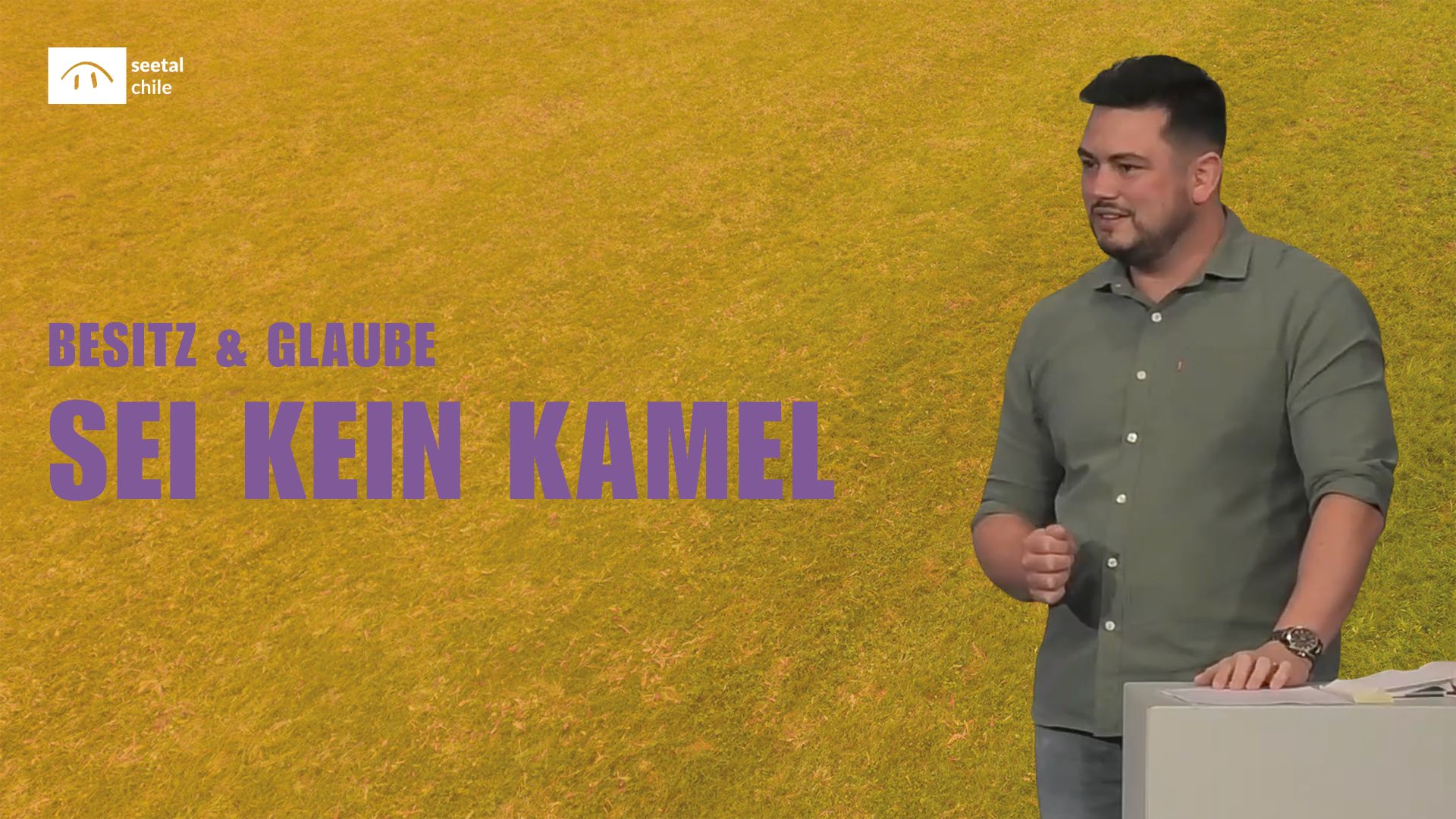A disciple builds on rocks
Series: Like you and me | Bible text: Matthew 7:24–27
Whoever listens to Jesus and acts accordingly is like a man who builds his house on rock. On the other hand, the one who only listens and does not act sinks his life. A disciple responds to Jesus» invitation to follow him and now does everything he can to share his whole life with him and become like him. «Disciple» is another name for the person who has a rocky foundation. Small groups are the training centre on the way to becoming a disciple.
The French Christian and evangelist Erino Dapozzo (1907 – 1974) tells of the time he was imprisoned in a German concentration camp: «At noon, the camp director sent for me. He sat at a laid table. I was roaring hungry. And then he started eating me one course after the other. I had to stand at attention and watch. Finally, he had coffee brought in. Pointing to the packet next to it, he said: «Look, your wife sent you this from Paris: Pastries!» I knew how little there was to eat and how my wife must have saved to make these biscuits. And then the camp leader started eating them. I asked him: «Give me at least one, I don’t want to eat it, I want to have it as a souvenir of my wife.» And laughing, he ate the last one. That was a moment when you start to hate.» Dapozzo continues, «At that moment I realised what it means: «The love of God is poured out in our heart.» I could love the man. I thought, «You poor man! You have no one to love you. Only hatred surrounds you! How good I have it as a child of God.» Then the man jumped up – he felt it – and ran out.» After the war, Dapozzo visited him. Then the man turned pale: «You want revenge!» «Yes,» said Dapozzo, «I want to have a cup of coffee with you. And in the car I brought a cake. And now we’ll eat and drink together!» It was then that the man was shocked to realise that a person who believes in Jesus Christ no longer has to hate. God’s love has been poured into his heart (from: Wilhelm Busch, Jesus unser Schicksal, Neukirchen-Vluyn 2004, p. 152f).
A voice is stirring in me that says: «You can’t do that, show him! Justice must be done!«Is there a difference between the emotions of my heart and those of Jesus? For he said on the cross in the face of his tormentors: «Father, forgive these people, for they know not what they do»(Luke 23:34). This is exactly what a disciple of Jesus is: he responds to Jesus» invitation to follow him and now sets out to share all of life with him and become like him.
Dapozzo has built his life on a rock. His house is immune to even the worst storms of life. On this rock, he is resilient against inner-soul storms such as inferiority, self-accusation or dark thoughts and also against external influences such as hostility, pain or hunger. How can we build our house of life on rocks? By living as disciples of Jesus! What does that mean?
Build as a fool
Such expletives are in the Bible. And in the following context: «But he who listens to me and does not act accordingly is a fool (moros); he is like a man who builds a house on sand»(Matthew 7:26 NL). A person who listens to God and does not act accordingly is a fool. Moros can also be used with a short-sighted and superficial attitude towards divine things can be translated. According to this definition, there are quite a few fools among Christians. It’s just the more comfortable way. It is quite pleasant to attend or stream an upbeat church service or to discuss God and the world in a small group. It is much more time-consuming and exhausting to do God’s Word.
We associate sand with holidays. Lying on a warm sandy beach is good for you. Lolling and basking in it is comforting. The sand moulds itself to our bodies. You hardly hurt yourself playing beach volley, everything is soft and malleable. Sand is associated with a holiday atmosphere. For children, the sand pile is very popular. They can play there for hours, building sculptures and rivers. We had a boy in our neighbourhood who just didn’t want to leave the sandpit era behind. We smiled at him under our breath.
Spiritually, too, we should leave the sand. It is not suitable for building one’s house of life on. We need a better foundation. Søren Kierkegaard said: «Christ does not want admirers, but followers. The admirer is the cheapest popular edition of the follower.«An admirer is one who enthusiastically hangs on the lip of Jesus, fully approves of it all, but does not act on it. A follower is a disciple who is passionate about becoming like Jesus.
Storms are good checks to find out where we have built on sand. Such a storm is currently sweeping through the world in the form of the coronavirus. What is wasting away in my life when I have no leisure activities, no work, no social contacts, and instead isolation and worries? A good check is also to assume that you belong to the risk group and would have clear symptoms. What would that do to you?
Build as a wise man
«He who listens to me and acts on it is wise and acts like a man who builds a house on solid rock»(Matthew 7:24 NL). It’s crazy, that little word «not» makes the difference between me building on sand or rock. In Greek, there are two tiny characters (me). This syllable distinguishes between a fool and an understanding, wise person, between an admirer and a follower or disciple. So little and yet so much. Jesus is very concerned that we build on rocks. Almost prayer mill-like, he repeats himself and challenges us to be not only hearers but also doers of God’s word.
Unlike sand, rock is sometimes quite uncomfortable. A few years ago, we spent our summer holidays as a family in Croatia, where there is a lot of rock and hardly any sand on the beaches. It’s quite exhausting. You can’t really settle down. You always have to find a new lying position. The rock does not adapt to me, I have to adapt to it.
But: By doing God’s word we build an exceedingly stable house of life on a rock. The example of Dapozzo speaks clearly. No storm can damage it, not even the greatest and last storm in earthly life, our dying. The following passage speaks of this: «Practise (Greek: gymnazo) doing the will of God!»(1 Timothy 4:7 Lut). And further: «Physical training has a certain value, but spiritual training is even more important, because it promises gain in this life as well as in the life to come» (4.8 NL). First of all: Yes, building a house on rocks needs more than lolling in the warm sand, it needs spiritual gymnastics. The gain in this life and in the future is huge and guaranteed. Last week I visited the railway museum in Bergün. On the Albula line, all the viaducts were built with stone. It was said that unlike iron bridges, these are much more durable. But it costs effort. But do not be afraid: we do not fall from grace when we hear and do. Both are based on God’s Word and His Spirit, who does everything for us if we want it.
Our small groups are meant to be places for spiritual gymnastics: places where we put the Word of God into practice. Gyms for discipleship. Jesus said: «Therefore go to all nations and make disciples of them»(Matthew 28:19 NL). We presented the three-thirds process to the shepherds in our groups:
- Look backIn the first third of the evening we look back at the highs and lows of the past days. We also talk about what we decided to do last time. Elements we communion and praise also belong in this part, if they occur at all.
- View upwardsIn this part we look at the Bible and the sermon from last Sunday. We talk about it and ask ourselves what God has to say to us.
- Looking aheadBased on the sermon, we practise listening. Each person asks God in personal prayer, «What exactly do you want me to do? Who should I tell about you in the next two weeks? Where do I need forgiveness? Who can I help? Whom should I encourage?
The experience is that the third third likes to fall under the table. It takes discipline to get to the point where God’s word is done. But we need to practise it. If we hear God’s Word for too long and do not do it, we become more immune to God’s Word. On the way to being a doer of God’s Word, we need each other, listening together, courageously tackling and honestly being accountable to each other.
You automatically get older, but not younger. 😉 The starting shot falls where a person responds to the call of Jesus «Follow me». When we walk in the dust of the great Rabbi called Jesus, we have the example and the energetic supernatural support for building houses on rocks. This Jesus invites you to follow Him and be His disciple!
Possible questions for the small groups
Read the Bible text: Matthew 7:24–27
- Give a definition for a disciple!
- What could be the obstacles for you to build a house on rocks?
- Tell about a storm in your life where your foundation was tested!
- Is the extraordinary state we are in also a storm for you? How do you deal with it?
- What do you think of the three-thirds process in the small groups? Could this be helpful for doing God’s Word?




